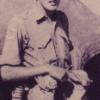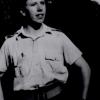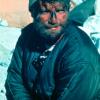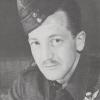As an officer and a gentleman you have one perk in the army and that's having a good batman. I had a good Royal Fusilier batman whom I had kept through the battle of France and Dunkirk in the early part of the war. When Churchill called for volunteers for parachute troops this wretched fellow came to me and said he'd like to go and try. I decided my duty to my country was to let him go. I was then looked after for six weeks by a Pioneer, which was an uncomfortable experience, so I had absolutely no alternative but to volunteer for parachuting in order to get my batman back! I was very lucky because Eric Down, who was commanding the 1st Parachute Battalion, wanted a second-in-command. I was interviewed by him at Bulford and he gave me the job.
Eric Down was the most marvellous battalion commander, but luck ran against him throughout the war, as he was always promoted before any battle took place. He was moved on to form the 2nd Parachute Brigade and on 17 July 1942, I was fortunate and became CO of the 1st Parachute Battalion.
In those days, to maintain morale and momentum, various raids were always being thought up. The first one I was involved in, which was to take the island of Alderney for 24 hours, wasn't really considered of sufficient importance to justify the effort. The next one was far more interesting. We were to drop in Dieppe with the Canadians and silence the coastal defence batteries. The great day arrived. We had got into the aeroplanes and the operation was cancelled. Apparently a front had come down which meant the aircraft could not have seen their DZs. This upset Lord Mountbatten, the Chief of Combined Operations, who decided to eliminate the air drop. A month later the operation took place and we were replaced by the commandos. We nearly had a mutiny on our hands from our fellows who had been waiting and training, some of them since 1940, and were now denied their battle. It was lucky for us in many ways that we didn't take part, because it appeared a costly failure. However, from the lessons learned very many lives were undoubtedly saved on D-Day and other seaborne operations.
Some time later I was sent for by Lord Louis. I and my adjutant presented ourselves at Richmond Terrace in Whitehall and were received in the hallway by a gorgeous, smart-looking MTC (Motor Transport Corps) driver who was slapping her boots with her stick. She escorted us upstairs where we were given a most secret woman, whose task was to type our operation orders for us. Then I met the great man who told me my task was to capture the island of Ushant and to hold it for 48 hours and then be taken off by Hunter-class destroyers. Ushant was heavily held and an important gun station in the Germans' coastal defences: it would be a very hard nut to crack.
I went back again to train the battalion vigorously for about a month and then we all went down to Hum airport where I was allowed to brief the chaps. They were thrilled because it was just up their street.
We all got into the aeroplanes, taxied to the end of the runway and prepared for take-off. Then the operation was scrubbed, again due to a front which scattered the Flying Fortresses which had taken off to bomb the relevant German airfields. The Fortresses were tailed by our latest high-altitude Spitfires, and came down over France and Spain. Quite understandably I had another near mutiny on my hands.
I decided we must do something fairly drastic to keep the chaps quiet, and so we went down to Exmoor to do some rather dangerous field firing exercises with live ammunition. I thought I was going to lose my commission there and then because some of the overs were going into Exford. After ten days of this I decided we would march back to Bulford which was about 112 miles. Every man had to carry about 60 pounds plus, and they were told that anybody who didn't make the grade would not go on the next operation. We did the march in about two and a half days. About 30 per cent, including one company commander, didn't make it. They paid the price. Others were hobbling and in much pain, but nothing would induce them to give up.
Shortly after the march I was told that we were going to sail to North Africa. We prepared for this and on 29 October 1942 set off from the Clyde in the Arundel Castle.
Our task was to capture Tunis airport at El Alouina. We had the most marvellous briefing arrangements for this which included wonderful models and maps, so we spent two or three hours every day on the ship, briefing all the way down to section level. When we got into the Mediterranean a very unwelcome message came through to say that 10,000 German parachute troops had been airlanded in Bizerta. So our beautiful planning went by the board.
We arrived in Algiers and spent the night in the Botanical Gardens. The next day I was told to take my battalion to the local airport at Maison Blanche. I was sent for and given my new orders by General Anderson. I thought he was probably a good general, but he was a crusty old boy who didn't know anything about parachute troops and didn't like what he had heard about them. I think he was pleased to get rid of us. He gave me very clear orders. The first one was to seize the key road junctions at Beja in Tunisia some 400 miles to the east of where the British Army was forming up near Algiers. The second was to harry the enemy wherever we could find them; and third, and most important of all, was to bring the French Army in on our side. I thought to myself, fancy being paid for doing this. It was too good to be true. We also had to see if Souk el Arba, which was 30 miles from Beja, was suitable as an air-landing strip for fighter aircraft.
Off we went in Dakota aircraft commanded by a splendid American colonel. He and his men had never dropped parachutists before. They also had no intercom between their aeroplanes and no intercom within the aircraft itself. The only map I could get hold of was a one quarter inch to the mile French motoring map, which included Beja!
We hadn't got enough aircraft to take the whole battalion so I had to leave some behind. As we were taxi-ing off the next morning I looked out of the pilot's window and was horrified to see about 20 chaps, borrowed parachute in one hand and weapon in other, running to the doors and being pulled in by their mates. We had to abort the mission because cloud came down and we couldn't see a thing, but next morning we had a wonderful flight. The plan was that as soon as everyone saw me jump the other sticks were to follow, which they all did.
As soon as we got on the ground we commandeered (we were very good at this sort of thing) transport, some of which was fuelled by charcoal. I left Alistair Pearson with some men to pick up the precious parachutes. While the equipment was being salvaged arrangements were made for the funeral of Private Webster who had been killed on the drop. The whole town turned out for the funeral.
I left orders for the battalion to stop at the top of the hill overlooking Beja and I went down into the town with Major des Voeux, our liaison officer, to interview General Barre, the French area commander. The French had a great inferiority complex about German armour and so I was cross-examined as to what weapons we had to deal with German tanks. I told him in the most glowing terms of the armoured divisions that were rushing to our aid and of our very latest, secret type of anti-tank mortars! After more discussion in our best French, he agreed to let us take over. I asked how many men he had holding the junctions. He told me he had a regiment of 2,500 men. Quite obviously we could not take over in broad daylight otherwise our numbers (525) would be exposed.
At dusk the next day I sent the first lot in with red berets and large gaps between the men and as soon as they cleared the town they doubled up the hill and joined on behind the next group who were all wearing steel helmets. We dressed up medical trolleys to look like our secret weapons and marched through the town twice – which completely fooled them. We took over from the French regiment and neither they, nor the enemy, had any idea of our weakness in numbers.
We wanted desperately to bring the French in on our side and demonstrate to the local population that the Germans were not infallible. We had learnt that each morning a column of German armoured vehicles would come up to the French lines on the road to Mateur and exchange cigarettes and food at 11 am. I got permission from the French to send Major Cleasby-Thompson's S Company through their lines and minefield to carry out an ambush on this convoy.
The next morning the column consisting of three heavy eight-wheeled armoured cars and three armoured recce vehicles passed as expected. While they were fraternizing with the French, S Company laid two belts of '75' grenades across the road approximately 20 yards apart. Two further mine belts were laid some hundreds of yards down the road after the tail of the column had passed. The company then took up ambush positions along the road. The recce vehicles had led the column down so the armoured vehicles would lead it back. The excitement among the men was intense. They had been waiting and training for this for two years. At eleven o'clock the leading armoured vehicle approached and a groan could be heard as it passed straight over the first belt of mines. Everyone reckoned it would blow up on the second belt, but it appeared to have a charmed life and passed over it to the utter dismay of S Company. The second armoured car however, made no mistake and blew itself up good and proper on the first row of mines. The armoured car that had got through must have thought his mate had got a puncture and slowly backed all the way down the road onto the second string of mines and blew itself up. There was a short and furious scrap and all the Germans who were left were taken prisoner. A great success.
I know under the Geneva Convention I shouldn't have done this, but I put the prisoners into two captured recce vehicles and, with our drivers, drove them through Beja to show the French how we dealt with German armour. It happens once in a lifetime. It was marvellous. The French were delighted and they appeared to regard our men as mysterious wizards who could deal with the German armour of which they were so afraid.
The Germans retaliated the next day by Stuka-ing Beja. Within minutes of this the Arabs started looting. The French then shot the looters and peace prevailed. This German attack incensed the French and made them better disposed to our cause.
We were now well on the way to carrying out two of the tasks, namely, harrying the enemy and holding the town of Beja, but we still had to bring the French Army in on our side. On 19 November a meeting took place between the French divisional commander at Medjez el Bab and the German Minister to the Bey of Tunis, who demanded that the Germans be allowed to man the bridge at Medjez at 11 am the next morning. We had made it clear to the French that if the Germans attempted to cross the bridge at Medjez we would fight them, no matter if the French took part. The French general got exasperated with the German minister and told him they would fight. The news reached us at 3 am. It meant our remaining task was on the way to being accomplished.
The next day the Germans attacked in force at 11 am. The French backed by R Company under Major Conron fought magnificently. The French casualties were particularly high. But the Germans were beaten back, so our third task was successfully completed. Later that day we heard that a mixed American gunner battery (which came from the south across the mountains) would arrive to support us in the Medjez el Bab sector. We saw them approaching at a furious speed. Much to our consternation, the column advanced and swept straight on to the forward slope covered by the German positions. A furious battle started. When we had extricated them their commanding officer was asked the reason for this unusual manoeuvre. He explained that some 14 miles back his gun teams had worked it out that one of them could be the first American to fire a shot against the Germans in World War II.
On the morning of 22 November I visited the French at Sidi N'sir. A French sailor who had been discharged after being wounded by the British at Oran told us that an Italian force of about 300 men, plus tanks, were harboured, each night, about nine miles north east of Sidi N'sir. I decided that we would attack that night. The French gave us a company of Goums (Moroccan troops) who carried our extra mortar ammunition. I thought this was marvellous — the French really were on our side.
Our immediate objective was a small hill called Gue. It was a moonlit night and you could see the stars. We were endeavouring to keep as quiet as possible, but every farmhouse we came to had a bloody dog that barked. However, we got to the foot of the hill undetected. I sent our excellent Royal Engineer troops, under Captain Geary, round to the back of the hill to mine the road leading to it, so if any armour tried to escape they would be blown up.
As we got ready to attack three loud explosions shook the air. The sappers had been carrying their Hawkins anti-tank mines in sandbags ready to lay them. Somehow, one of them had accidentally exploded and set off the rest. Three officers and 24 men were killed.
The Germans opened up at once. Heavy machine-gun fire was coming from a conical hill with a gradient of one in three. The assault went straight in and the two platoons swarmed the stone wall to finish off the enemy with bayonets. Sitting where I was I could see three tanks which were firing rather ad lib down the hill. I thought this was too good to be true, we must do something about it. So I got hold of two or three chaps and went up the side of the hill where we could see the first of these tanks which was blazing away. It was rather a small tank, but it was dug-in. Most armoured vehicles have a little round hole which they can open up to peep through. I put my revolver into the hole and pulled the trigger and of course the bullet went whee-e-e-e! all the way round the inside of the tank. Up went the hatch of the tank and out came a chap shouting 'Italiano, Italiano!' This was too good to be true. That was the first tank dealt with. We went up to the next tank, I put the revolver in and again the same thing — 'Italiano, Italiano!' This seemed much too good. We went up to the third tank and tried the same thing again. Everything looked as if it was working all right, but instead of an Italian, out came a great big German. He was a much tougher chap. He came out with his hands up, and I saw that he had a revolver in his right hand. As he jumped down, he shot at me. One bullet hit me in the middle of the chest and two others hit me in the neck and arm and I went down.
Eventually I was collected and taken down to the foot of the hill to Headquarters. They sent a message for Alistair Pearson. As I lay there an extraordinary flash came to me — you are not going to die! So I was very pleased to accept that one. After that it never occurred to me that I would die, and I handed over to Alistair. Miles Whitelock, my adjutant, was brought in. Poor fellow, he had been shot in the head and lost part of his nose, which is an extremely unpleasant thing to happen.
Both Miles and myself were put in the side-car of a motorcycle which had been captured in the battle, and driven down a railway track, bumping all the way over the sleepers for five miles or so, to Sidi N'sir. When we got there we were taken to Beja where my parachuting surgical team had set up. I was taken into a cottage room and operated on by Captain Robb, who undoubtedly saved my life.
I had three weeks in the Casualty Clearing Station at Souk el Arba before evacuation to the General Hospital in Algiers. Whilst there, one morning the matron and cleaners came in. I was 'spruced up' and to my amazement General Giroux, who had taken over from Admiral Darlan as C-in-C in North Africa, a magnificent 6ft 3in, covered in a big moustache and medals, swept in, kissed me on both cheeks, removed the Legion of Honour from his aide, Capitaine Bajaine, and pinned it on my pyjamas.
I had french windows to my room so I was able to do some illicit training by night. When I judged myself sufficiently fit, I made an unofficial exit from the hospital and returned to 1 Para Brigade. It was immediately obvious to me, as it was to Brigadier Flavell, the brigade commander, that Alistair Pearson had done such a splendid job commanding the battalion in my absence that there could be no question of removing him. In order to resolve his problem, and save me from the ire of the hospital authorities, he arranged an immediate flight for me, via Gibraltar, to the UK and home.
This article is reproduced from Max Arthur ‘Men of the Red Beret’(1990), Hutchison (ISBN 0-09-173931-4), by kind permission of the author.
Reproduced for ParaData by kind permission of Max Arthur
Source:
This article is reproduced from Max Arthur ‘Men of the Red Beret’(1990), Hutchison (ISBN 0-09-173931-4), by kind permission of the author.
Read More




Latest Comments
There are currently no comments for this content.
Add Comment
In order to add comments you must be registered with ParaData.
If you are currently a ParaData member please login.
If you are not currently a ParaData member but wish to get involved please register.